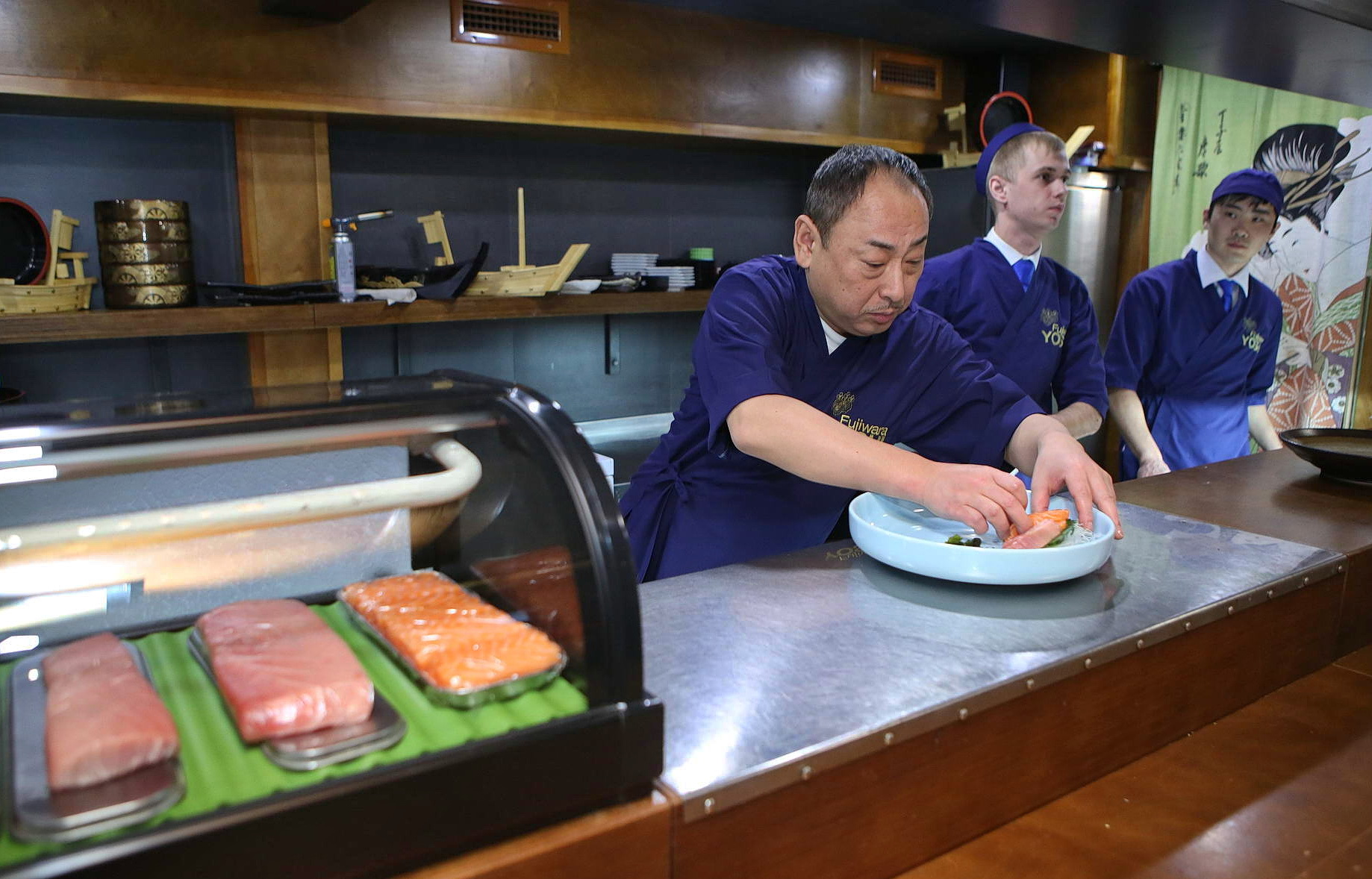In 1999, when Fujiwara Yoshihiro, then a Japanese restaurant chef in Chicago, got on a plane, he thought he was relocating to Nice, France.
When the plane landed for a connection in Kazakhstan, Fujiwara suspected that something went wrong. He took a closer look at his ticket, then at a map, and raised his eyebrows: He was heading to Ukraine, the country in Eastern Europe he knew nothing about.
It turned out that Fujiwara misunderstood the European businessman who offered him a job. The language barrier and cultural differences added to a confusion that led the chef to believe he was invited to work in France, while in fact it was Ukraine.
Despite the suddenness of this turn of events, Fujiwara decided to give Kyiv a try.
Twenty years later, Fujiwara is married to a Ukrainian woman and has a 7-year-old son. He runs two Japanese restaurants in Ukraine – one in Cherkasy and one in Kyiv – both named after him, Fujiwara Yoshi.
“We do not only serve Japanese food,” Fujiwara says. “We serve Japanese culture.”
In his restaurants, he says, most products are delivered from Japan, the fish is always fresh, and there is no “junk Japanese food.” He keeps the prices high, but guarantees that guests eat the same high-quality food as they would get in Japan.

Japanese head chef Fujiwara Yoshihiro prepares a set of sushi at his own restaurant Fujiwara Yoshi on Feb. 6. (Kostyantyn Chernichkin)
Japanese standards
Fujiwara notices that Ukrainians have their own preferences in Japanese cuisine. First of all, they always request more soy sauce.
“They will put sushi in soy sauce before even trying it,” he says.
Ukrainians also usually need more food than Japanese people to get full.
But since his first Ukrainian encounter, Fujiwara says that Ukrainians are now much more acquainted with Japanese cuisine.
“When I came to Ukraine in 1999, Japanese food was very expensive and only for the ‘chosen ones.’ For example, back then in the United Stated one sushi roll would cost $10, while in Ukraine the price was up to $25 because of the delivery cost,” he says. “It was really hard to find Japanese ingredients in Ukraine.”
The situation has improved however, and now the Fujiwara Yoshi menu boasts eight kinds of oysters, fresh tuna and sake.
“We could order sake from China or the United States and it would be cheaper,” Fujiwara says. “But we want the best products for our restaurants, so we deliver it from Japan.”
There is a secret to making good sushi, Fujiwara says. Aside from fresh seafood, there are four ingredients which make all the difference. The key one is a special kind of rice, called shari.
Oksana Fujiwara, Fujiwara’s wife and chief executive at Fujiwara Yoshi, explains that one kilogram of this rice costs Hr 200, so other Ukrainian restaurants usually opt for a cheaper rice costing Hr 20-60 per kilogram.
“We know all the suppliers,” Fujiwara’s wife says. “If someone was buying the same good rice as we do, we’d know, but no one does that.”
Other important ingredients are: wasabi paste, gari ginger, and nori algae.
“Shari, wasabi, gari and nori – without these products sushi won’t be tasty,” Fujiwara says.
Fujiwara family believes it’s their true purpose to enlighten Ukrainians on what real Japanese cuisine tastes like, and they are planning to continue doing that.
“I have a family here, a child, a business, and my wife cooks me Ukrainian borscht,” Fujiwara says. “We are not planning to leave.”
Family history
Fujiwara’s arrival to Ukraine is purely a matter of accident.
Working in Chicago in a Japanese restaurant, he met a man from Ukraine who invited him to work in Europe. But because of the cultural misunderstanding and the language barrier, Fujiwara thought he was invited to France. Only when boarding the plane he understood that France was not the destination.
“I took a look at the map, found Ukraine on it and shouted: ‘What?!’,” Fujiwara says.
He decided to stay in Ukraine for a while, and in a couple of months, in 2000, he met his wife, who at the time was a college student.
“I was studying and also working in a restaurant – first as a waiter and then in the kitchen,” Oksana Fujiwara says. “Yoshi was the head chef there.”
Soon after they got together and in 2002 the couple decided to relocate to Moscow.
“But in 2010 our son Eiji was born, and in 2011 we decided to move back to Ukraine,” Fujiwara’s wife says.
They opened a restaurant in Oksana’s hometown of Cherkasy the same year. Two years later they opened another one in Kyiv.
The couple is now working on opening their third restaurant and constantly introducing new menu choices to match the global trends.
Fujiwara’s recommended choices from his restaurant’s menu:
Dobinmushi (Hr 195). Traditional clear soup cooked with tiger shrimp, Gillardeau oyster and Eringe mushroom, served with a slice of lime.
Assorted Hon Maguro (Hr 870). Sashimi Hon Maguro, Sushi Maguro Hon, roll Maguro Philadelphia, roll Hon Maguro, all made with tuna.
Sashimi O-toro (Hr 435). The fattiest part of the belly of Bluefin tuna.
INFOBOX
Fujiwara Yoshi in Kyiv
15A Solomianska St., tel.: 38044-360-0209, www.yoshi-fujiwara.ua. Open 11 a.m. – 11 p.m.
Fujiwara Yoshi in Cherkasy
205 Shevchenko Blvd., tel.: 38068-469-0590. Open 11 a.m. – 11 p.m.
